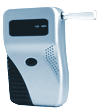California Vehicle Code VC 23577 – Chemical Testing: Refusal to Take or Failure to Complete: Enhanced Penalties
23577. (a) If any person is convicted of a violation of Section 23152 or 23153, and at the time of the arrest leading to that conviction that person willfully refused a peace officer’s request to submit to, or willfully failed to complete, the chemical test or tests pursuant to Section 23612, the court shall impose the following penalties:
- If the person is convicted of a first violation of Section 23152, notwithstanding any other provision of subdivision (a) of Section 23538, the terms and conditions of probation shall include the conditions in paragraph (1) of subdivision (a) of Section 23538.
- If the person is convicted of a first violation of Section 23153, the punishment shall be enhanced by an imprisonment of 48 continuous hours in the county jail, whether or not probation is granted and no part of which may be stayed, unless the person is sentenced to, and incarcerated in, the state prison and the execution of that sentence is not stayed.
- If the person is convicted of a second violation of Section 23152, punishable under Section 23540, or a second violation of Section 23153, punishable under Section 23560, the punishment shall be enhanced by an imprisonment of 96 hours in the county jail, whether or not probation is granted and no part of which may be stayed, unless the person is sentenced to, and incarcerated in, the state prison and execution of that sentence is not stayed.
- If the person is convicted of a third violation of Section 23152, punishable under Section 23546, the punishment shall be enhanced by an imprisonment of 10 days in the county jail, whether or not probation is granted and no part of which may be stayed.
- If the person is convicted of a fourth or subsequent violation of Section 23152, punishable under Section 23550 or 23550.5, the punishment shall be enhanced by imprisonment of 18 days in the county jail, whether or not probation is granted and no part of which may be stayed.
(b) The willful refusal or failure to complete the chemical test required pursuant to Section 23612 shall be pled and proven.
Added Sec. 84, Ch. 118, Stats. 1998. Effective January 1, 1999. Operative July 1, 1999.
Amended Sec. 39, Ch. 22, Stats. 1999. Effective May 26, 1999. Operative July 1 1999.
» Return to California Vehicle Codes
Note: Laws change frequently and thus the information provided should not be relied upon as legal advice. To be certain, contact a criminal defense attorney for a legal assistance.
www.NoCuffs.com is not liable for any misinformation that users obtain from using this site.



